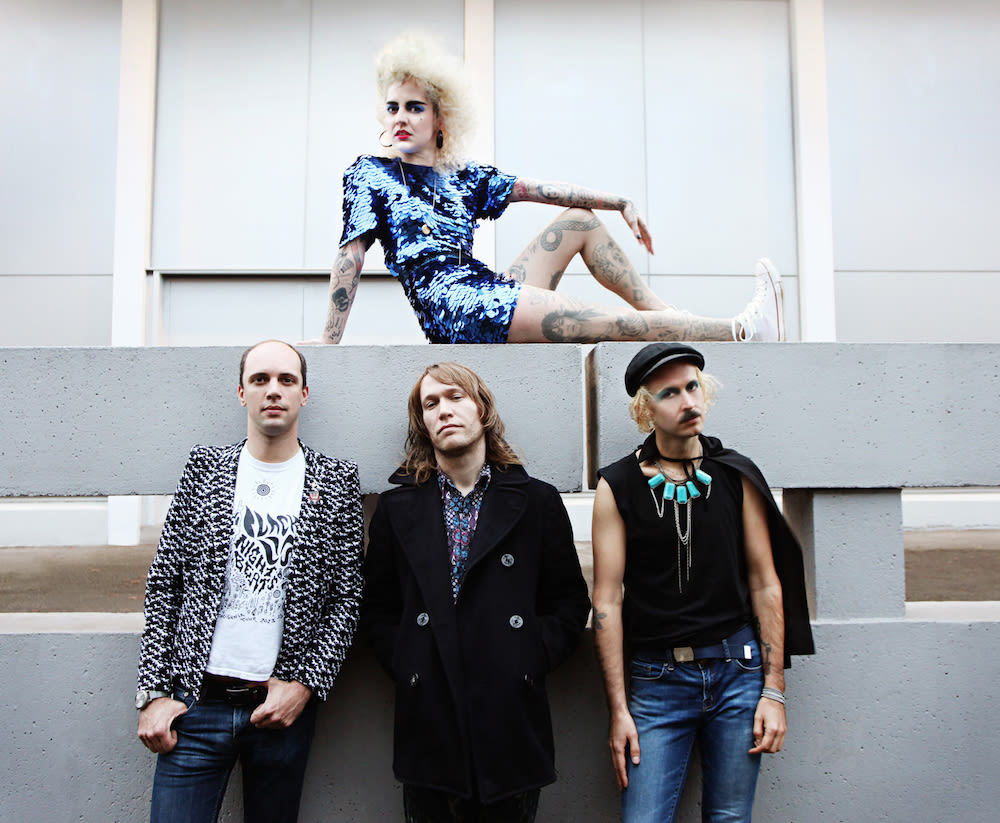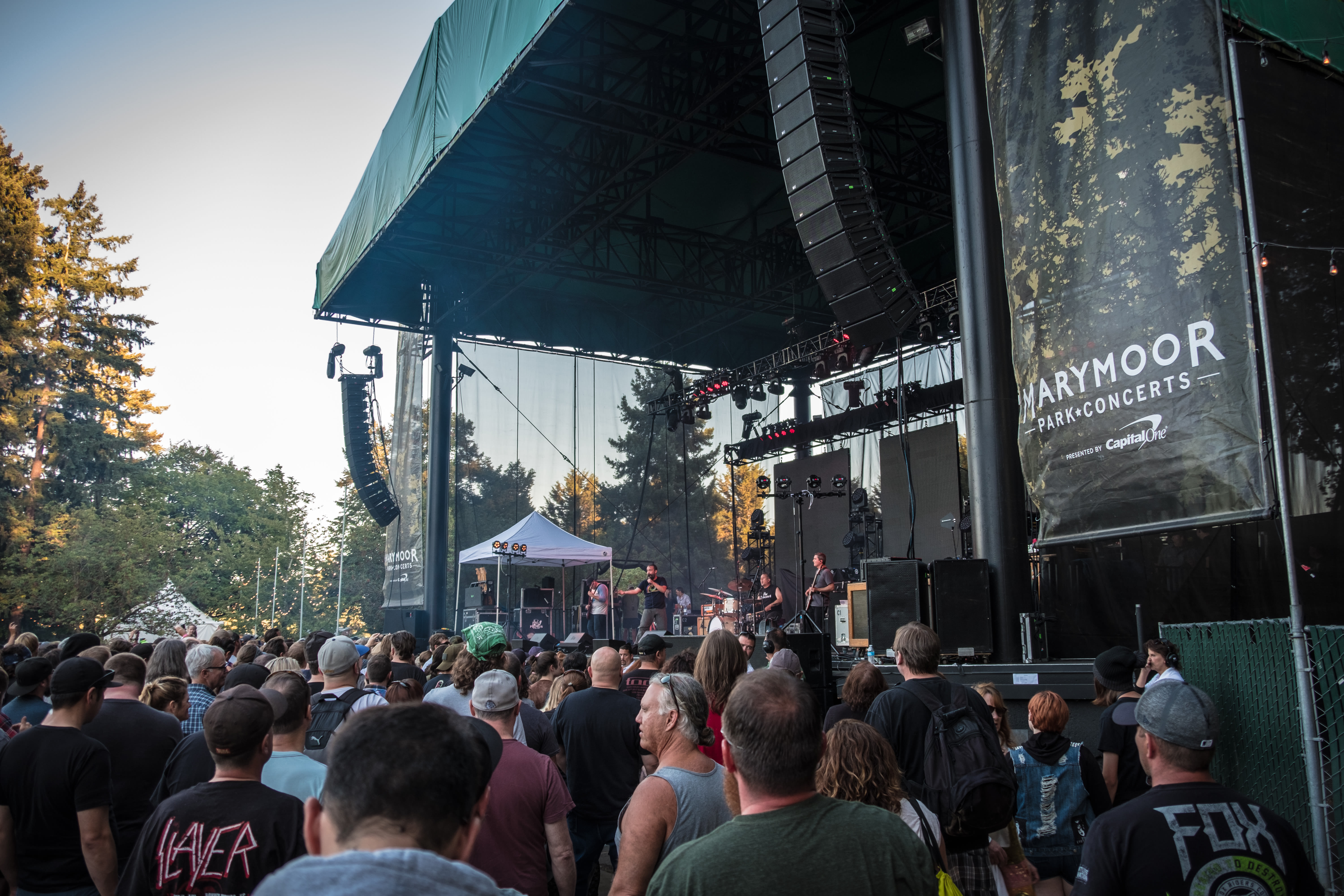A Fiendish Conversation with Shannon Perry of Gazebos

Gazebos brings its unique style to Chop Suey to release Die Alone.
Image: Photo Courtesy Kelly O
When it comes to exuberant oddballs, Gazebos reigns supreme in the Seattle rock scene. Fronted by acclaimed local tattoo artist Shannon Perry (of Valentine's Tattoo Co.), the group creates a mussy musical collage of bug-eyed punk energy, thrift store glam, weirdo art rock, and tripped out ’80s dance parties. This Friday, February 19, Gazebos heads to Chop Suey to release its first Hardly Art LP Die Alone with help from Midday Veil and Wild Powwers.
For our latest Fiendish Conversation, we chatted with Perry about Die Alone as an outlet for personal catharsis, late-onset Seattle Freeze acceptance, and screaming into the meaningless void.
What’s your favorite aspect of Die Alone?
I think probably my favorite thing about the album is that we made it at all. We were making it during a fairly difficult moment in my life, and so it ended up being a very therapeutic process for me—having that to sort of like focus my feelings on. So, I think ultimately it’s more what it was able to do for me than anything I could think about it like, oh, my favorite song off of it is this or that. It’s sort of like an overarching emotional feeling I have about the album. It was something I was lucky enough to be able to do and focus on during a difficult time.
This is my first time putting out an album on a label and having it recorded in any sort of legitimate way. So I am kind of more interested to see how it’s received. I’m curious about it. It seems like a different thing than the performance. When I listen to it, I feel self-conscious, like huh, is this what it is? It’s really hard for me to have an objective viewpoint on it because I have so many memories of creating it.
When I’ve seen Gazebos play live there’s a very distinct sort of art weirdo vibe that’s different from any other Seattle bands. Does that just stem from the collection of characters in the band or something else?
I think that every member of our band is some sort of freak in one way or another, and I don’t think any of us are necessarily the same kind of freak. If there’s any sort of weirdo vibe coming out of it, it is definitely just a combination of our vibes. [Guitarist] TV [Coahran] has been making music that I think is very fringy and strange for a long time, and I knew in joining the band that I would be trying to take what he did and sort of almost clash against it. He and I have very strong voices. I didn’t necessarily want to just blend in with what he was doing, I definitely wanted to create something that was sort of sitting with it. I kinda see our band as like a two divas band. We construct the songs very separately. He constructs a lot of the instrumentation, and then I construct the vocals. We don’t usually jam it out in person.
Is there anything that you feel artistically overlaps between your tattoos work and making music?
I guess I kinda think all life is sorta art anyway, just cause of a general existential crisis that has been really showing me that nothing matters. So that’s why it feels okay for me to cover my body in tattoos and/or get on stage and screaming into the void, because I just don’t know why I’m here in the first place. [Laughs] So I think that’s the connection. I think naturally, I’m a really shy person. Like I have a lot of social anxiety, which also doesn’t make any sense to me. If you can honestly believe that nothing matters and then you have social anxiety, can’t you just be like it doesn’t matter and then the social anxiety would go away? So I think that looking freakish or performing in wild ways is kind of where I think I’m able to get out those ya-yas, even though when it comes to like talking to a person or a stranger in the street, I might completely clam up.
How has Seattle influenced your artistic approach?
I think enormously, just because I was born and raised here. But since I was born and raised here, I didn’t have a lot of perspective about places besides Seattle being different. And having the opportunity to travel in bands and whatnot has really shown me how much I do like Seattle. I’m a very sensitive person, an extremely liberal person, and I didn’t even realize how lucky I was to be in Seattle for that reason. Because I go to other places and I’m like terrified whether it’s strange bigotry or not having a recycle bin or something. [Laughs] I’m always kind of a fish out of water.
But it’s hard to talk about Seattle and how it’s affected me right now since it’s right in the process of going through an enormous change, demographically speaking, and the arts community becoming very shattered. I’ve always been Capitol Hill-centric and that’s becoming a totally different neighborhood.
And there’s also the shyness—the Seattle Freeze, that whole thing. I think that’s a real thing, and I didn’t even realize that’s what we were like until you meet actually friendly people and they seem jarringly invasive. [Laughs]
Do you have any preshow routines?
I’m a formerly superstitious person. Usually when I feel a superstition setting in, I try to intentionally do whatever the thing is that I’m not supposed to do just to be like whatever. When I first started, I would chant nothing matters in my head over and over again because that would help me. Or I would walk out there and look look directly at the audience—right at all of their faces—just to sort of look at it: here’s what I am doing, I’m getting on a stage and these people are looking at me and I’m going to do something. Just the whole thing seems so hilarious to me. When I’m performing, a lot of the time I will close my eyes so I don’t even think about anyone looking at me so that I’ll be as honest and as free as possible. I just don’t want to be inhibited up there.
Gazebos: Die Alone Release Show
Feb 19 at 10, Chop Suey, $10–$12




